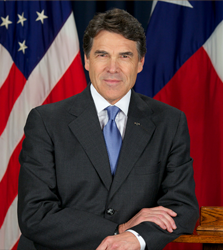
Perry’s Exit May Have an Impact on the Race
The news at the end of last week that former Texas Gov. Rick Perry was suspending his campaign for the GOP nomination and exiting the race took few by surprise, as numerous stories in recent weeks had reported on his campaign’s lack of funds and poor showing in the polls. The New York Times this morning has an interesting story detailing polling data that show Perry lost more than half of his support to businessman Donald Trump when the latter got into the race:
The Candidates Donald Trump Has Hurt the Most
Of the 608 Republicans in the survey, 54 percent moved off their initial choice — 20 percent to Mr. Trump and 34 percent to one of the other candidates….
These voters came to Mr. Trump from all of the other candidates, but a disproportionate share of voters for Mr. Perry and Chris Christie abandoned them for Mr. Trump. Mr. Perry lost more than 60 percent of his May support to Mr. Trump, perhaps a harbinger of things to come.
Mr. Christie lost 57 percent. In contrast, Jeb Bush lost only 14 percent of his early support to Mr. Trump, the least of any candidate.
The Times also reports that some candidates are better positioned than others to either recover voters lost to Trump or gain new supporters if he exits the race:
Nearly 60 percent of the Ted Cruz supporters from May who switched to Mr. Trump said they would return to Mr. Cruz if their first choice were eliminated. Mr. Christie and Mr. Bush would get about a third of their straying voters back, while Mike Huckabee and Mr. Perry would see less than a fifth come home….
If Mr. Trump left the race tomorrow, this survey finds that the biggest share of his supporters would go to Ben Carson, who would collect 18 percent of Mr. Trump’s current supporters. Carly Fiorina is next in line, followed by Mr. Cruz and [Marco] Rubio, each garnering around 12 percent of Mr. Trump’s voters.
There hasn’t been much analysis about who benefits most by Perry’s departure, not surprising for a candidate who has been near the bottom of the polls for the last few months. CNN explained it this way:
The departure of Perry, who had little support in early-voting states or among the GOP donor class, is unlikely to alter the contours of the Republican race….
It is unclear which candidate, or candidates, will inherit the support of Perry's backers. In the past, Perry has repeatedly gone out of his way to lavish praise on another candidate with Texas roots: businesswoman Carly Fiorina.
A Perry endorsement could have an impact depending on who the beneficiary is – for example, a Fiorina endorsement would be a significant boost to her credibility, while an endorsement for Bush would be simply one more in a long line of endorsements.
But Perry could have an impact on the early debate hosted by CNN on Wednesday, with there being two main competing possibilities.
Possibility No. 1 is that Perry’s departure, along with Fiorina’s elevation to the main stage on Wednesday, will make it easier for one of the four remaining candidates in the early event to shine and catch the attention of activists, donors, and most importantly the media. (The four who will be in the early event are South Carolina Sen. Lindsey Graham, Louisiana Gov. Bobby Jindal, former New York Gov. George Pataki, and former Pennsylvania Gov. Rick Santorum – former Virginia Gov. Jim Gilmore did not qualify.) Perry had as good a chance as any of those four to replicate the performance of Fiorina in the first “undercard” debate, and his absence means one less contender vying to be the winner.
The second possibility is that the combination of Perry’s and Fiorina’s absences, and to a lesser extent Gilmore’s, diminishes the early event to the point that few will watch or pay much attention to whoever is declared the winner of the early event. The number of candidates on stage in the first undercard suggested the depth and strength of the Republican field, while the fact that there will be only four on stage this time around could wind up reinforcing the idea that they are at the back of the pack for a reason.
If either of these scenarios plays out, or if Perry endorses another candidate, he could wind up having a greater impact on the 2016 Republican nomination now that he’s out of the running than he had while he was in the race.



